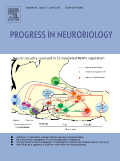
PROGRESS IN NEUROBIOLOGY
Scope & Guideline
Advancing the Frontiers of Neuroscience
Introduction
Aims and Scopes
- Neurobiological Mechanisms:
The journal emphasizes studies that elucidate the underlying neurobiological mechanisms of brain function, including molecular, cellular, and circuit-level insights. - Neurodevelopment and Plasticity:
Research on neurodevelopmental processes and plasticity, particularly how these processes are affected by genetic, environmental, and pathological factors, is a core area of focus. - Neurological Disorders and Therapeutics:
The journal highlights research aimed at understanding the pathophysiology of neurological disorders and exploring novel therapeutic targets and interventions. - Neuroimaging and Electrophysiology:
Studies utilizing neuroimaging techniques and electrophysiological methods to investigate brain dynamics and connectivity are prominently featured. - Behavioral Neuroscience:
The journal includes research that links neurobiological findings to behavioral outcomes, examining how brain function influences cognition and behavior.
Trending and Emerging
- Neuroinflammation and Immune Response:
Research focusing on the role of neuroinflammation and the immune system in neurological disorders is gaining traction, highlighting the importance of the neuroimmune axis. - Gene Therapy and Genetic Editing:
Emerging studies on gene therapy and CRISPR-based genetic editing techniques are becoming more prominent, reflecting advancements in precision medicine for neurodegenerative diseases. - Neurotechnology and Brain-Machine Interfaces:
There is an increasing number of papers addressing neurotechnology, including brain-machine interfaces and neuromodulation techniques, showcasing innovation in therapeutic strategies. - Connectomics and Network Neuroscience:
Research exploring brain connectivity and network dynamics is on the rise, emphasizing the importance of understanding brain function in terms of complex networks. - Translational Research and Personalized Medicine:
The journal is increasingly publishing studies that bridge basic research with clinical applications, focusing on personalized approaches to treatment for neurological conditions.
Declining or Waning
- Basic Electrophysiology Studies:
There has been a noticeable decline in the publication of fundamental electrophysiological studies, possibly due to a shift towards more integrative approaches that combine electrophysiology with imaging techniques. - Animal Models of Neurodegeneration:
Research solely focused on traditional animal models of neurodegenerative diseases seems to be less frequent, as newer methodologies and models are being explored. - Neuropharmacology of Established Drugs:
Papers concentrating on the effects of well-established neuropharmacological agents are becoming less common, indicating a potential shift towards novel compounds and mechanisms. - Neuroanatomical Mapping:
While still relevant, traditional neuroanatomical mapping studies are less frequent, as there is a growing emphasis on functional and connectivity-based approaches. - Historical Perspectives on Neurobiology:
There appears to be a waning interest in historical analyses of neurobiology, with more contemporary and forward-looking studies taking precedence.
Similar Journals

Frontiers in Cellular Neuroscience
Advancing the frontiers of neuroscience research.Frontiers in Cellular Neuroscience, published by FRONTIERS MEDIA SA, is an esteemed open-access journal operating out of Switzerland that has been at the forefront of disseminating cutting-edge research since its inception in 2007. With a focus on the cellular and molecular aspects of neuroscience, this journal addresses fundamental questions and advances our understanding of the nervous system, making it indispensable for researchers, professionals, and students in the field. As of 2023, it is ranked in the Q2 category for Cellular and Molecular Neuroscience, positioned at rank #27 out of 97 in Scopus, and boasting a notable 72nd percentile ranking, reflecting its impactful contributions to the discipline. The journal's commitment to open access enhances the accessibility of vital research findings, promoting knowledge sharing and collaboration. Researchers looking for a platform to publish groundbreaking neuroscience research will find Frontiers in Cellular Neuroscience an ideal venue for reaching a wide audience.

CELLULAR AND MOLECULAR NEUROBIOLOGY
Pioneering Insights into Cellular and Molecular Processes.CELLULAR AND MOLECULAR NEUROBIOLOGY, published by SPRINGER/PLENUM PUBLISHERS, stands as a significant contributor to the fields of cell biology and neuroscience, holding a distinguished position in the academic community with an impact factor that places it in the Q2 category for both Cell Biology and Cellular and Molecular Neuroscience, along with Q1 in Medicine (miscellaneous). Since its inception in 1981, this journal has provided a critical platform for innovative research and thought-provoking reviews, fostering a deeper understanding of complex neurobiological mechanisms. The journal’s rigorous peer-review process ensures the publication of high-quality manuscripts that offer valuable insights into cellular processes and neural functions. With a commitment to advancing knowledge and promoting collaboration among researchers, CELLULAR AND MOLECULAR NEUROBIOLOGY remains an essential resource for professionals and students alike, looking to stay updated on the latest developments in neurobiology.

NEUROBIOLOGY OF AGING
Transforming Understanding of Aging Through NeurobiologyNEUROBIOLOGY OF AGING, published by Elsevier Science Inc, is a premier journal dedicated to advancing our understanding of the complex interactions between the aging process and neurobiological mechanisms. With an ISSN of 0197-4580 and E-ISSN 1558-1497, the journal has established itself as a critical resource in the fields of Aging, Developmental Biology, Geriatrics and Gerontology, Clinical Neurology, and Neuroscience. Boasting a Q1 ranking in multiple categories, the journal is positioned within the top echelons of scholarly publication, underscoring its significant impact with an impressive Scopus ranking in various subfields. Committed to disseminating high-quality, peer-reviewed research, NEUROBIOLOGY OF AGING welcomes original articles, reviews, and research notes aiming to uncover the underlying processes of aging on the nervous system, fostering collaboration among researchers, professionals, and students alike. Although primarily subscription-based, the journal continues to play a vital role in shaping the discourse on aging and neurobiology, making it an essential publication for those engaged in this dynamic field.

CORTEX
Transforming Knowledge into Practice in Cognitive ScienceCORTEX is a premier international journal published by Elsevier Masson, focusing on the cutting-edge areas of cognitive neuroscience, psychology, and neurology. With an impressive impact factor that places it in Q1 quartiles across multiple categories such as Cognitive Neuroscience and Neuropsychology, this journal serves as a vital resource for researchers, clinicians, and students alike. Established in 1964, CORTEX has continued to excel in disseminating high-quality scholarly work, offering insights that significantly enhance our understanding of the brain's functioning and behavior. Although not an open-access publication, it provides various access options to ensure the dissemination of knowledge is as wide-reaching as possible. As the field of cognitive psychology evolves, CORTEX remains at the forefront, fostering an environment for interdisciplinary collaboration and innovation. Researchers seeking to stay engaged with the latest advancements will find CORTEX an indispensable tool for their professional development.

TRENDS IN NEUROSCIENCES
Leading the Charge in Neuroscience InnovationTRENDS IN NEUROSCIENCES, published by CELL PRESS, is a leading journal in the field of neuroscience, offering cutting-edge insights and important developments in the rapidly evolving landscape of brain research. With an impressive Impact Factor and ranking in the top quartile (Q1) of the category for Neuroscience (miscellaneous), it is positioned as a vital resource for researchers and professionals seeking to stay abreast of the latest discoveries and trends from 1978 to the present. Specifically ranked #3 out of 113 in General Neuroscience by Scopus, this journal promotes the interdisciplinary exchange of ideas and knowledge, making it an essential platform for students and experienced scholars alike. Although it is not an Open Access journal, its value lies in its rigorous peer-review process and commitment to maintaining the highest standards of academic integrity. By continuing to explore the complexities of neural processes and behavior, TRENDS IN NEUROSCIENCES plays a crucial role in shaping the future of neuroscience research and education.

Behavioral and Brain Functions
Advancing the Science of Mind and BehaviorBehavioral and Brain Functions is a leading Open Access journal published by BMC, dedicated to advancing the field of behavioral neuroscience, cognitive neuroscience, and biological psychiatry since its inception in 2005. This esteemed journal, based in the United Kingdom, has established itself as a vital resource for researchers and professionals, boasting a remarkable influence demonstrated by its Q1 and Q2 rankings across multiple relevant categories. With its commitment to providing unrestricted access to high-quality research, the journal facilitates the dissemination of significant findings in understanding the complex interactions between behavior and brain function. The journal ranks impressively within the Scopus database, positioning itself among the top-tier publications in its categories, making it an essential platform for academic discourse and innovation. As it converges through 2024, Behavioral and Brain Functions continues to play a crucial role in shaping the forefront of neuroscientific inquiry, inviting contributions that challenge our understanding and promote further exploration in these dynamic fields.

NEUROSCIENCE RESEARCH
Unveiling the Mysteries of the MindNEUROSCIENCE RESEARCH, published by Elsevier Ireland Ltd, is a leading journal in the field of neuroscience, with a notable reputation for disseminating high-quality research that spans a variety of topics within the discipline. With an ISSN of 0168-0102 and an E-ISSN of 1872-8111, this journal serves as a vital platform for both established researchers and emerging voices in the field. Ranking in the Q2 quartile in both Medicine and Neuroscience categories, it has been recognized as a reliable source of innovative findings since its inception in 1984, with continuous publication through 2024. Although it does not currently offer Open Access options, the journal is indexed in Scopus, holding a significant position at Rank #48/113 in General Neuroscience, reflecting its contribution to advancing the understanding of neural mechanisms across various contexts. With its address anchored in Ireland, NEUROSCIENCE RESEARCH plays an essential role in bridging scientific inquiry and practical applications, making it an indispensable resource for researchers, professionals, and students dedicated to the burgeoning field of neuroscience.

Eneurobiologia
Innovating Understanding of the Nervous SystemEneurobiologia is an esteemed open-access journal published by UNIV VERACRUZANA, INST INVESTIGACIONES & EDUCACION, dedicated to advancing research in the vibrant field of neurobiology. With its launch in 2010, the journal aims to disseminate high-quality, peer-reviewed research articles that explore the complexities of neural systems, neurodevelopment, and neurodegenerative disorders. By providing a platform for both established researchers and emerging scholars, Eneurobiologia fosters interdisciplinary collaboration and knowledge exchange within the scientific community. Its open-access model ensures that valuable findings are accessible to a global audience, promoting the widespread application of neurobiological research. As a crucial resource for students, professionals, and researchers alike, Eneurobiologia plays a pivotal role in shaping the future of neurobiological studies and enhancing our understanding of the brain and nervous system.

Network Neuroscience
Charting New Territories in Neuroscience and MathematicsNetwork Neuroscience is a premier open-access journal published by MIT Press, focusing on the interdisciplinary nexus of neuroscience, applied mathematics, artificial intelligence, and computer science. Since its inception in 2017, the journal has established itself as a leading outlet for innovative research and cutting-edge methodologies, ensuring disseminated knowledge is freely accessible to all. With an impressive Q1 ranking in multiple categories including Applied Mathematics, Artificial Intelligence, Computer Science Applications, and Neuroscience, it serves as a vital platform for scholars, professionals, and students to explore the intricate networks that underpin cognitive processes and brain function. The journal is committed to advancing the understanding of complex neural mechanisms through interdisciplinary approaches and remains a crucial resource for anyone engaged in the burgeoning fields of network science and neuroscience research.

BRAIN RESEARCH BULLETIN
Fostering scholarly dialogue in the realm of neuroscience.BRAIN RESEARCH BULLETIN is a leading academic journal published by PERGAMON-ELSEVIER SCIENCE LTD, dedicated to the dissemination of high-quality research in the interdisciplinary field of neuroscience. Since its inception in 1976, this journal has served as a vital platform for researchers, professionals, and students interested in a broad spectrum of topics within neuroscience, making significant contributions to the understanding of brain function and its associated disorders. With a commendable impact factor and a current Scopus rank of #35 out of 113 in general neuroscience, the journal holds a Q2 quartile ranking, underscoring its relevance and influence in the academic community. BRAIN RESEARCH BULLETIN invites submissions of original articles, reviews, and brief communications, enhancing scholarly communication within this dynamic field. Although the journal is not open access, it ensures widespread reach and impact through various subscription models, allowing access to pivotal findings that pave the way for future research advancements. For researchers aiming to share impactful discoveries and insights within the neuroscience community, BRAIN RESEARCH BULLETIN remains an essential outlet.